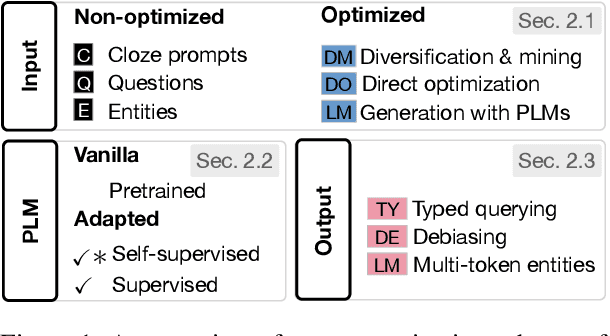Osman Alperen Koraş
Less Finetuning, Better Retrieval: Rethinking LLM Adaptation for Biomedical Retrievers via Synthetic Data and Model Merging
Feb 04, 2026Abstract:Retrieval-augmented generation (RAG) has become the backbone of grounding Large Language Models (LLMs), improving knowledge updates and reducing hallucinations. Recently, LLM-based retriever models have shown state-of-the-art performance for RAG applications. However, several technical aspects remain underexplored on how to adapt general-purpose LLMs into effective domain-specific retrievers, especially in specialized domains such as biomedicine. We present Synthesize-Train-Merge (STM), a modular framework that enhances decoder-only LLMs with synthetic hard negatives, retrieval prompt optimization, and model merging. Experiments on a subset of 12 medical and general tasks from the MTEB benchmark show STM boosts task-specific experts by up to 23.5\% (average 7.5\%) and produces merged models that outperform both single experts and strong baselines without extensive pretraining. Our results demonstrate a scalable, efficient path for turning general LLMs into high-performing, domain-specialized retrievers, preserving general-domain capabilities while excelling on specialized tasks.
Towards Conditioning Clinical Text Generation for User Control
Feb 24, 2025Abstract:Deploying natural language generation systems in clinical settings remains challenging despite advances in Large Language Models (LLMs), which continue to exhibit hallucinations and factual inconsistencies, necessitating human oversight. This paper explores automated dataset augmentation using LLMs as human proxies to condition LLMs for clinician control without increasing cognitive workload. On the BioNLP ACL'24 Discharge Me! Shared Task, we achieve new state-of-the-art results with simpler methods than prior submissions through more efficient training, yielding a 9\% relative improvement without augmented training and up to 34\% with dataset augmentation. Preliminary human evaluation further supports the effectiveness of our approach, highlighting the potential of augmenting clinical text generation for control to enhance relevance, accuracy, and factual consistency.
CLUE: A Clinical Language Understanding Evaluation for LLMs
Apr 11, 2024Abstract:Large Language Models (LLMs) have shown the potential to significantly contribute to patient care, diagnostics, and administrative processes. Emerging biomedical LLMs address healthcare-specific challenges, including privacy demands and computational constraints. However, evaluation of these models has primarily been limited to non-clinical tasks, which do not reflect the complexity of practical clinical applications. Additionally, there has been no thorough comparison between biomedical and general-domain LLMs for clinical tasks. To fill this gap, we present the Clinical Language Understanding Evaluation (CLUE), a benchmark tailored to evaluate LLMs on real-world clinical tasks. CLUE includes two novel datasets derived from MIMIC IV discharge letters and four existing tasks designed to test the practical applicability of LLMs in healthcare settings. Our evaluation covers several biomedical and general domain LLMs, providing insights into their clinical performance and applicability. CLUE represents a step towards a standardized approach to evaluating and developing LLMs in healthcare to align future model development with the real-world needs of clinical application. We publish our evaluation and data generation scripts: https://github.com/TIO-IKIM/CLUE.
A Second Look on BASS -- Boosting Abstractive Summarization with Unified Semantic Graphs -- A Replication Study
Mar 05, 2024Abstract:We present a detailed replication study of the BASS framework, an abstractive summarization system based on the notion of Unified Semantic Graphs. Our investigation includes challenges in replicating key components and an ablation study to systematically isolate error sources rooted in replicating novel components. Our findings reveal discrepancies in performance compared to the original work. We highlight the significance of paying careful attention even to reasonably omitted details for replicating advanced frameworks like BASS, and emphasize key practices for writing replicable papers.
Give Me the Facts! A Survey on Factual Knowledge Probing in Pre-trained Language Models
Oct 25, 2023



Abstract:Pre-trained Language Models (PLMs) are trained on vast unlabeled data, rich in world knowledge. This fact has sparked the interest of the community in quantifying the amount of factual knowledge present in PLMs, as this explains their performance on downstream tasks, and potentially justifies their use as knowledge bases. In this work, we survey methods and datasets that are used to probe PLMs for factual knowledge. Our contributions are: (1) We propose a categorization scheme for factual probing methods that is based on how their inputs, outputs and the probed PLMs are adapted; (2) We provide an overview of the datasets used for factual probing; (3) We synthesize insights about knowledge retention and prompt optimization in PLMs, analyze obstacles to adopting PLMs as knowledge bases and outline directions for future work.
 Add to Chrome
Add to Chrome Add to Firefox
Add to Firefox Add to Edge
Add to Edge